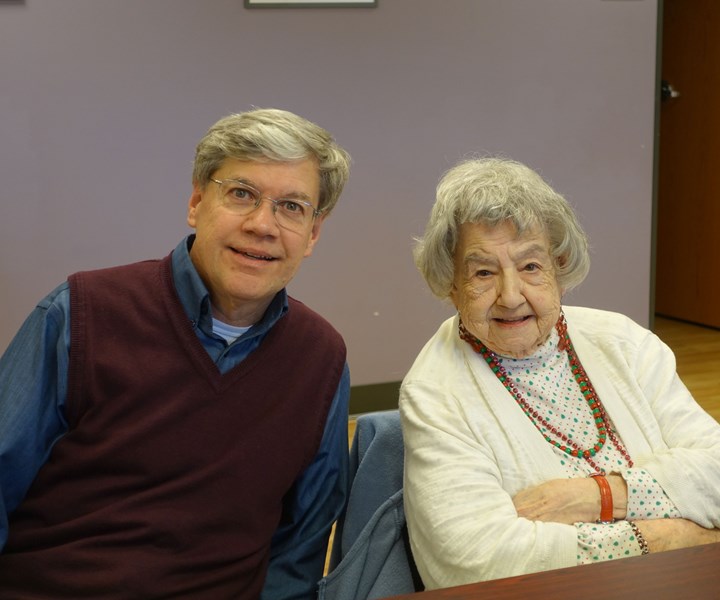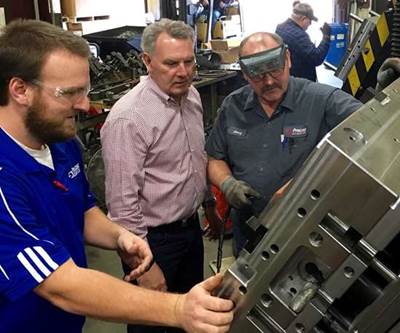Ruby the Riveter and a Reminder for the Times
During WWII, Ruby Shuman helped repair bombers. Her memories have a lesson for a country facing a crisis today.
Share






For Editor Emeritus Mark Albert, meeting and chatting with Ruby Shuman was a chance to “touch history.” When he told her that, she smiled big and gave a little shrug.
Our country has been in crisis many times. The COVID-19 (coronavirus) pandemic is the latest to test our mettle. We are reacting to it as we have to earlier crises: by working together, finding new strengths, taking new jobs and making sacrifices.
During World War II, certainly a prolonged crisis for the United States, we memorialized Rosie the Riveter, an icon of the many women who joined the manufacturing workforce to fill spots left vacant by those who went to serve in the armed services. Rosie the Riveter represented the can-do spirit of all Americans, but especially the thousands of daughters, sisters and mothers who went to work in America’s factories.
Late last year, I made friends with one of those women. Her name is Ruby Shuman. She is 94 years old. Like many elderly Americans, Ruby has a visual impairment called macular degeneration. I first met Ruby at a meeting of a support group for individuals with visual impairments and their spouses or caregivers. The group gets together monthly. My wife, Debbie, a low vision specialist at Clovernook Center for the Blind and Visually Impaired in Cincinnati, is the facilitator of this group. I’ve been tagging along at these meetings as a volunteer helper, an activity that I enjoy very much. Ruby is a member but isn’t able to attend every meeting.
I had been told that Ruby was a riveter during the war. She was in fact, a real-life Ruby the Riveter. Recently, before one of the meetings she could join, I sat with Ruby and we chatted about her experiences. “The war was on, and I certainly wanted to help,” she explained. “I was recently married and my husband was in the service in New York. I heard there were jobs at the Army Air Force Base in Rome, New York, so I applied. It seemed a great way to help and was better than sitting at home alone. I was only 19 years old.”
Ruby went on to tell me that she was hired to rivet patches onto bombers that had been damaged by bullet holes while on a mission. “I had about two weeks of training, and I learned to operate a riveting gun. We worked in two-person teams. Another lady like myself was my partner. While one of us fired the rivets into the metal patch on the outside, the other held a heavy block of iron against the skin of the plane on the inside. That block caused the rivet to flatten outside and flare inside to join the pieces. We took turns which one of us used the riveter and which one held the block. I liked holding the block best.”
I was curious about the kinds of aircraft she helped repair. “They were the big ones, the really big bombers. I remember that. The hangar was huge, but only three planes could fit inside.” I guessed maybe B17 or B24 bombers, but Ruby wasn’t sure. “You had to climb a ladder to get inside. Each plane had bombs painted on the side, one for each mission it flew. Also a picture of a girl — a cute one, of course.”
Other impressions came to her mind. “We had to work fast because the goal was to get these planes back into the air right away. The planes were big, but sometimes we had to crawl into tight spaces to reach the patch. It wasn’t real hard work, but it had to be done right. We enjoyed it. We really thought we were doing an important job, and we were!”
Ruby remembers that the women employed at this base were hard workers and good-natured. “There were all kinds of women working together. Many of them worked at tables making repair parts. We made friends. We laughed. But we took the work seriously and were proud of it.”
I asked Ruby if she felt she had gotten the recognition women like her deserved. She gave me a puzzled look. “Well, heck, we had a job to do. There wasn’t anything special about what we were doing compared to those fighting the war. We thought of them as the heroes. We were just doing our part to support them.”
Ruby told me that she was a riveter for about a year or so. “I sure didn’t like the cold winters in New York,” she remarked. By then the war was beginning to wind down and she returned to Cincinnati, her hometown. “Better weather here!” After her husband could join her, they stayed in the city together until he passed away several years ago.
I wanted to know what she valued most from her career as Ruby the Riveter. “Oh, well, that was a long time ago. It’s the only time I worked in something like a factory. It was nice to look at the patches we did. You could see the difference we were making. We did our part.”
Every national crisis has presented our country with unique challenges, many of them unprecedented and accompanied by new uncertainties or unfamiliar concerns, many grave. Comparing one crisis to another mostly shows how little control we have over the forces that ultimately determine our survival.
At the moment, Ruby’s story reminds us that working together (perhaps remotely from home or at the appropriate social distance at the workplace) and doing one’s part are the things that matter as this pandemic takes its course. Every citizen of every nation on earth is bound to this same, simple obligation.
Read Next
Mold Maker Announces 5-Part Coronavirus Response
Plans for protecting people and lead times alike involve not only concrete action, but also clear communication.
Read MoreDoes Asia's Low-Cost Manufacturing Option Still Make Sense?
As U.S.-based companies try to stay ahead of COVID-19, global supply chains are under renewed scrutiny. Are uncertainties and delays caused by global crises worth the short-term cost savings?
Read More





















.png;maxWidth=300;quality=90)







